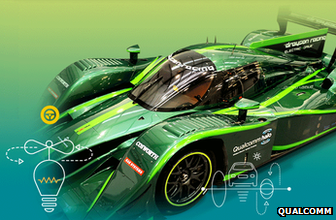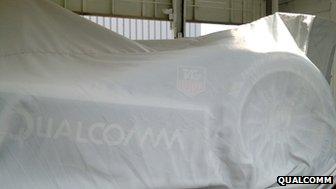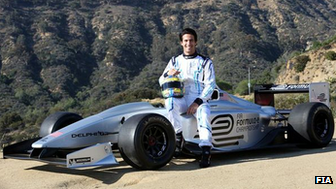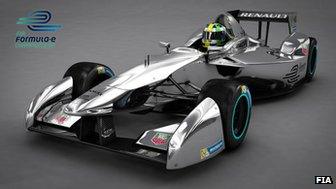Formula E to use Qualcomm technologies in electric cars
- Published

Qualcomm had already been working with Formula E team Drayson Racing ahead of the announcement
Smartphone chipmaker Qualcomm has signed a sponsorship deal with the forthcoming Formula E championship.
The FIA international motorsports body plans to launch the electric-car competition next year as an alternative to Formula 1.
Qualcomm will provide wireless-charging and augmented-reality technology to help the teams taking part and the public watching the races.
It has also pledged an undisclosed sum of money as part of the five-year deal.
Both organisations said the intention of the championship was to both provide entertainment and to spur on electric-vehicle technologies.
One analyst said the events could help improve the public's perception of electric cars, but added there would need to be other developments if the tech was to go mainstream.
The FIA itself acknowledged change would not come overnight.
"We will make people more inclined to buy an electric car, but this will take time - five or 10 years," Formula E's chief executive Alejandro Agag told the BBC.
Wire-free recharges
Among the products Qualcomm plans to offer is its wireless vehicle-charging tech, Halo.
The facility - which is being developed by the company's London-based lab - creates an electromagnetic field using a copper pad buried in the ground. This can be picked up by a coil built into a vehicle, which converts it into electricity to power-up a battery.
British Formula E team Drayson Racing Technologies has already tested a customised version of Halo as a way of charging its vehicles when they are stationary.

The FIA will unveil a Qualcomm-branded Formula E car later this week
However, the intention is to use the tech to recharge only the competition's safety vehicle during the first year of the championship before extending it to the competitors' cars in either year two or three.
In time, Qualcomm said, several pads could be built into the city centre roads used by the races to provide "dynamic charging" - the ability for the cars to top up their power on the go, helping them complete the race in quicker time.
South Korea has already pioneered something similar, using a locally developed variant of mobile recharging tech called OLEV to power buses on a set route.
However, such schemes are costly and the FIA said it recognised the competition would need to prove popular if it was to raise the sums necessary to pay for the installation of the many pads required.
Live updates
Qualcomm also intends to help design the telemetrics system used by the race - the automated process that monitors the vehicles taking part.
"Tyre pressure, engine, fuel, brake fluid, speed, torque - all sorts of things will be monitored on a miniscule nanosecond by nanosecond basis," explained Anand Chandrasekher, Qualcomm's chief marketing officer.

Former F1 driver Lucas di Grassi was appointed Formula E's series test driver last year
"Those streams of data will be sent real-time to a central area where the teams will be able to get access to that information and use it with their own proprietary software to say, 'OK, what guidance should we provide the driver as to what he or she should be doing in real time?'"
He added the information would also be able to be accessed by the public through the planned roll-out of its Vuforia software.
The app promises to offer an "augmented reality" view of the race, allowing spectators to carry on watching the car of their choice even if buildings or other objects obstruct their view by holding up their smartphone or tablet to make the vehicle visible.
Mr Chandrasekher said the public would be able to bring up the same real-time performance data as the racers' support teams, using the progam.
'Psychological impact'
Formula E is scheduled to commence in September 2014 in London, with races to follow in nine other cities including Beijing and Los Angeles.
Ten teams, each with two drivers, will compete against each other over the course of an hour.
Mr Agag said he believed the events would appeal to a younger audience than that typically attracted to Formula 1, and he hoped many of the fans would end up becoming electric car owners.
"We think Formula E can be a platform where companies can showcase and develop and improve technologies for electric road cars," he said.

The Spark-Renault SRT-01E will be one of the cars competing in the Formula E competition
"We will demonstrate that batteries will offer more performance and go longer. At the beginning [the drivers] will swap cars, but this will stop as the batteries improve, and people will see the cars go faster.
"This, we hope, will have a psychological impact and make people more inclined to buy an electric car."
One independent automobile expert agreed the competition could prove influential.
"There's a perception issue with electric vehicles - people worry about how far they will go and the cost of the batteries," said Prof David Bailey, from Coventry Business School.
"This could show people how well they work.
"But a lot of other things need to happen including changes in government policy if there's to be the necessary investment in wireless charging and other infrastructure beyond the racetracks."
- Published25 June 2013
- Published9 March 2013
- Published25 July 2012